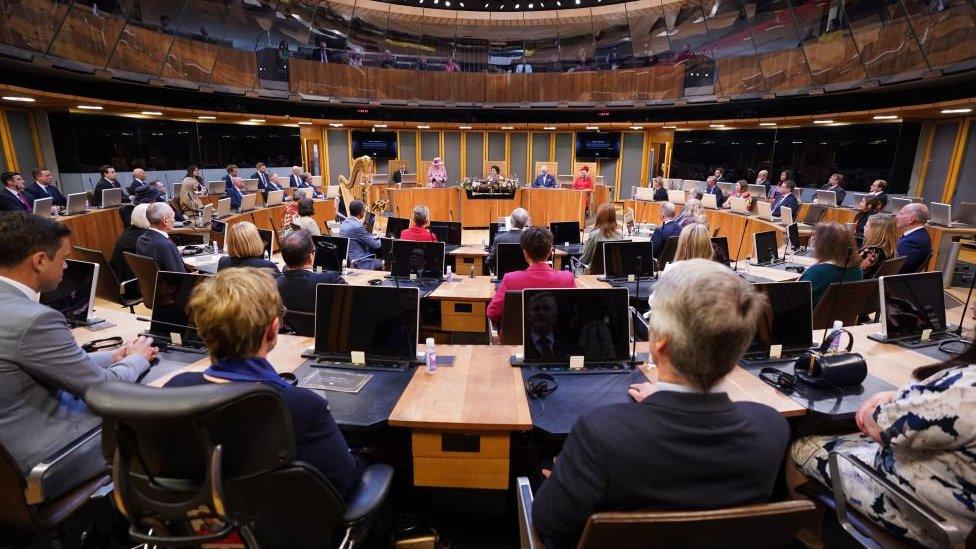Welsh Parliament complaint window cut to six months
- Published

Complaints about Senedd members are investigated by the standards commissioner, Douglas Bain.
The time limit for staff to make complaints about the behaviour of Senedd members has been halved.
The parliament's standards committee now says complaints should be made within six months.
Delayed complaints may be considered if the standards commissioner believes there was a "good reason" for the delay.
A union said the change must not be used to "wipe the slate clean for bullies".
The FDA, which represents Senedd commission staff, said there must be a "window of opportunity" for historic complaints to be made and called for an independent process similar to Westminster.
The new procedure also says the standards committee may choose not to publish full investigations by the commissioner, who investigates complaints on the Senedd's behalf.
Standards committee chair Vikki Howells wrote that the new time limit was to "ensure that recollection of events is still fresh and evidence readily available".
Members of the Senedd (MSs) are expected to uphold the code of conduct, external for the Welsh Parliament in how they behave in their personal and professional lives.
It includes rules which say MSs must not act in a way that brings the Senedd into disrepute, must not subject anyone to personal attack, must uphold the criminal law and must not misuse allowances or resources made available to them.
The public and others can make complaints about MSs to the standards commissioner, Douglas Bain.
If he decides to investigate and finds wrong doing, the standards committee, which is made up of a cross-party group of MSs, decides whether a sanction is required.
That can include a temporary ban from from the Senedd. The MS would be stripped of their salary for that period of time.

The Welsh Parliament is based in the Senedd building in Cardiff Bay.
Mr Bain, in his evidence to a consultation on the changes, said a six-month cut-off would prevent "the abuse of process" experienced in recent years when a submission of a complaint "was delayed until the complainant judged the complaint would cause most political damage".
Mr Bain, who has been standards commissioner since late 2019, said the "good cause" exception would ensure the proposed cut-off had no adverse impact on a complainant.
The procedure does not set out specifics for what a "good cause" might be, although the consultation said guidance would provide some examples, such that the circumstances of the complaint prevent engaging with the process any earlier, and pressing work or family issues.
'The process should be clearly defined'
FDA's national officer for Wales Gareth Hills told BBC Wales: "We understand the merits of setting a timescale for making complaints but this can't be used to wipe the slate clean for bullies and repeat offenders.
"When the procedure is introduced, there must be a window of opportunity for staff to bring forward historic complaints to be investigated."
He said consideration of later complaints "should not be at the discretion of the commissioner - there should be a clearly defined process under which exceptional case can be considered".
"There may be circumstances in which staff do not feel comfortable raising a complaint until an MS has left the Senedd, and this is more likely to be the case with very serious allegations such as sexual harassment.
But he said the wider point "is that under current procedures MSs are still marking their own homework, as final decisions on sanctions against MSs found to have breached the standards of conduct must be endorsed by the whole Senedd".
He said it fell short of the Independent Complaints and Grievance Scheme established in Westminster, which is now used to investigate complaints of bullying and harassment of MPs.
In its report the cross-party group said the current process, as it stands, "was working well".
The standards committee agreed it should have the choice to redact or summarise reports written by the standards commissioner, either on the basis of confidentiality, or for reasons where the committee considered there is a risk of "harm or distress to any person".
Previously the procedure simply required that the commissioner's report was published, albeit it would be anonymised in cases where no breach of the code was found.
Appeals scrapped
Senedd members have also scrapped the appeal process available to MSs accused of breaching the code of conduct - although not all of the committee's members agreed to this.
Welsh Conservative Andrew RT Davies was opposed to ending appeals.
The process allowed an MS to make an appeal if they believe a committee's conclusions are based on significant factual inaccuracies, or there has been a procedural inaccuracy.
The Conservatives said the process gave MSs an opportunity "to ensure they have been treated fairly".
Douglas Bain said the process was "wide open to abuse by members who simply wish to delay the making of a finding".
The outcome of investigations into Neil McEvoy, the former South Wales Central MS, was not published until after the Senedd election last year, despite the committee having concluded its decision months before the vote.
He was found to have repeatedly breached Senedd rules but recommended sanctions were never implemented.
Related topics
- Published23 February 2022

- Published30 October 2018

- Published27 April 2022
